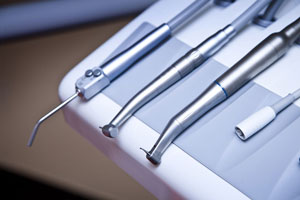Family Dentistry
Being a practitioner of family dentistry means that we cover most of the usual, general dental care needs of our patients of all ages. From general preventive dentistry procedures to more complicated oral surgeries, we have the skills and experience you’re looking for. The wide range of services we provide makes our practice a good choice for the entire family.
Fillings
This common treatment for tooth decay has come a long way since the days when silver amalgam was your only choice. Though these fillings are still in use today, most people would rather have a filling made of tooth-colored composite resin. After the decay is removed using special dental tools, the putty-like resin is used to fill the space and is cured with a special light.
Dental Implants/Implant Dentistry
For a patient who is healthy enough to undergo the procedure, a dental implant is the most permanent tooth replacement one can have. Implant dentistry is also the procedure that most closely mimics the natural tooth. First, the implant, which is a screw-like post made of titanium, is surgically implanted into the jawbone. The implant will fuse, or osseointegrate, with the bone, to act as the new tooth root. This usually takes between three and six months. When the bone and post have fused, the post will be fitted with an abutment, then the abutment will be crowned, providing the patient with a brand new tooth. Dental implants require only the usual dental hygiene routine. Many patients claim they even forget the tooth is not natural.
Root Canals
Though the words root canal may sound intimidating, the procedure was devised to alleviate pain. Root canals, also know as endodontic therapy, are done when a tooth is badly decayed and infected. A root canal treatment involves opening the tooth and removing the infection, sanitizing the area and filling the tooth to prevent bacterial growth and to strengthen the tooth. Most of these teeth require a crown for stability.
Tooth Extractions
We believe it is always best to save the patient’s natural tooth if possible. Some circumstances do arise that require the extraction of teeth. Badly broken or decayed teeth may need to be pulled. Another common reason for tooth extractions is due to crowding of the teeth when wisdom teeth, also known as the third molars, are trying to (or already have) erupt. Sometimes the space in the mouth is not sufficient, necessitating extraction.
TMJ/TMD Relief
If you have jaw pain, you may have a problem with your TMJ, or Temporo-Mandibular Joint. Problems with this joint are known as TMJ disorder or TMJ disease. TMD can be a complex problem, and only a trained dentist can determine if your problem is caused by jaw dysfunction. Some symptoms include:
- pain when opening/closing the mouth
- grating, scraping, or popping noise when opening jaw
- swelling of the face
- jaw joint that “locks” in place
Many who suffer with TMJ disorder can be helped with the use of night guards to protect the teeth from bruxism, also know as grinding or clenching the teeth. For very severe cases, sometimes surgical procedures are recommended.
Dentures
Dentures are the best known teeth replacement technology available, and have been successfully used by millions of patients over the years. Dentures can replace an entire arch of teeth, or can be made (partial dentures) to replace several in one arch, if that is what the patient requires. If you’re missing teeth and would like to return function and esthetics to your smile, schedule a consultation to find out how we can help.
Deep Cleaning
A deep cleaning differs from the usual dental prophylaxis in that there is more attention given to the area below the gum line. Deep cleaning is designed to eliminate plaque and tartar under the gum, in order to keep periodontal disease from developing or worsening. Deep cleanings are typically done in four visits, one quadrant of the mouth is worked on each time. This is to break up the amount of time the patient has to spend in the chair and to allow for healing between visits. Deep cleaning may be more uncomfortable than a regular cleaning, so sometimes anesthetic is used. If you have questions about periodontal health and deep cleanings, don’t hesitate to ask. We want you to be educated and informed about your dental health.









